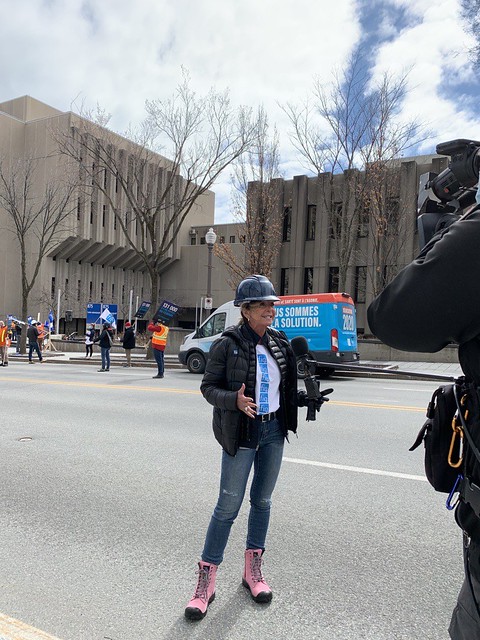
APTS-FIQ alliance says there can be no agreement in principle without a catch-up pay increase
Andrée Poirier and Nancy Bédard, the two presidents of the APTS-FIQ alliance, showed up this morning in front of the building housing the Treasury Board Secretariat to remind Treasury Board president Sonia LeBel that no agreement in principle can be reached without significant progress in terms of pay.
“Of course, when it’s time to find money to support private enterprise, invest in building projects or reward Investissement Québec bosses, the government has no problem loosening the purse strings,” said Poirier and Bédard to union members who had joined them in front of the building. “But when it’s time to invest in the people who provide care and services in the health and social services system, when it’s time to recognize the true value of their expertise, suddenly Premier Legault and his ministers Sonia LeBel and Christian Dubé are completely broke. They need to understand that the expert knowledge of our 131,000 members is something that has to be paid for.”
The pandemic has demonstrated how crucial the health and social services system really is. Lives are saved not by entrepreneurs, but by our members – something the government tends to forget when it’s time to pay the piper. To illustrate the Legault government’s obsession with the construction industry and its complete inertia in terms of employer offers, healthcare professionals and professionals and technicians from the health and social services system poured litres of concrete on the first three sets of government offers. All three sets embody essentially the same suggested pay raise, i.e., a paltry 5% over three years. The APTS-FIQ alliance is demanding a 12.4% increase, of which 7.4% involves no more than catching up.
Paid a woman’s wage
For the APTS-FIQ alliance, a catch-up increase is particularly necessary given that personnel agencies and private companies are seeking to access their members’ expertise through generous pay offers. These businesses are having an easy time of it. Over the past 20 years, pay raises for APTS and FIQ members have always been below inflation, leading to a constant erosion of their purchasing power. The current government is not doing anything differently. Clearly, it believes that the male category always outweighs the female.
“It’s not normal that in 2021, we should still be bearing the brunt of austerity policies because the majority of our members are women,” say Nancy Bédard and Andrée Poirier. “The premier and his sidekicks need to leave the 1950s behind and join the 21st century. The time for paying us a woman’s wage is over.”
Dead silence on Québec’s regions and their needs
Surprisingly for a government that is constantly saying it was elected by Québec’s regions, none of the offers presented to healthcare professionals, and professionals and technicians in the health and social services system, includes measures to help retain personnel in regions that are far from major urban centres. These are areas where the labour shortage is particularly acute.
“Breaches of services due to lack of personnel are regularly seen in communities in the Nord-du-Québec, Abitibi-Témiscamingue and Côte-Nord regions,” say the two presidents. “And now we’re starting to see breaches in the Gaspé, in the northern part of Mauricie and Saguenay–Lac-Saint-Jean, and even in some regional county municipalities in the Outaouais and Bas-Saint-Laurent. These communities are simply being abandoned. How can the government justify what it’s doing?”
